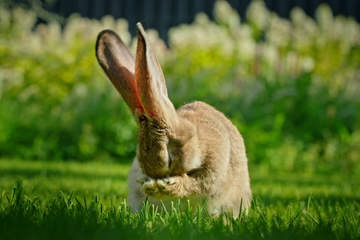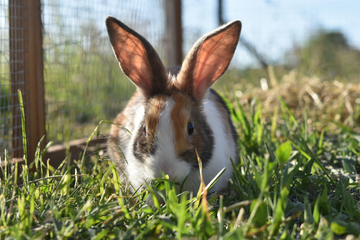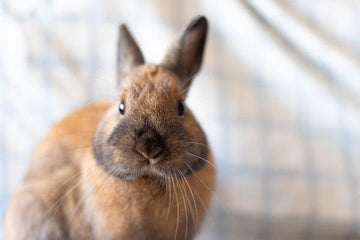Tips to Manage Rabbit Chewing Habits
Rabbits have a long-standing reputation for chewing on almost anything they can get their teeth on. From chair legs to baseboards and everything in between, their relentless gnawing can be equal parts cute and frustrating. So what's going on inside your bunny's brain—and more importantly, their mouth—that makes this behavior so common?
Click Here For a Guide to Understanding Your Rabbits Diet.

Before you can curb or redirect rabbit chewing habits, it helps to understand why they chew in the first place. Their behavior is natural, sometimes psychological, sometimes environmental, and often related to their physical needs. Let's dive into what causes it and what you can do to manage it.
What Drives Rabbit Chewing Habits?
Rabbit chewing habits are instinctive. A rabbit's teeth grow continuously throughout their life. Unlike humans, rabbits don't lose their baby teeth; their teeth never stop growing. This means they have to regularly grind them down through chewing. Without the right materials to chew on, their teeth could overgrow, leading to painful conditions and a need for veterinary correction.
But that's not the only reason your furniture takes a hit. Rabbits are naturally inquisitive and social creatures. Chewing often becomes a behavioral outlet when they're bored, lonely, anxious, or not mentally stimulated. So, if your bunny's nibbling on your coffee table, they might be trying to tell you something.
Even during festive seasons, like Christmas, rabbits get especially curious about new decorations, gift wrapping, or party snacks. While it's adorable to see them sniffing around the tree, monitoring them more closely around the holidays is important to prevent them from gnawing on potentially dangerous objects like dyed paper or foil ribbon.
Psychological Triggers Behind Rabbit Chewing Habits
Rabbits chew for more than just dental maintenance. Their personalities, emotional needs, and gender can influence their chewing tendencies. Outgoing and intelligent rabbits often look for stimulation in their environment. They might chew for attention or entertainment if left alone for too long.
If you can't spend extended time with your rabbit during the day, consider getting them a bonded companion. As recommended by the House Rabbit Society, a second bunny can go a long way in reducing destructive behavior caused by loneliness or boredom.
Interestingly, female rabbits tend to chew more than males. Once they reach maturity, it's wise to get them spayed or neutered. This helps with controlling chewing behavior and balances their hormone levels, which often results in a calmer bunny overall.
Environmental Causes of Excessive Chewing
Housing plays a big role in shaping rabbit chewing habits. Keeping a rabbit confined in a cage for long periods can lead to boredom and stress—two common triggers for chewing. Even if they must be temporarily penned during recovery or when you're not home, they still need ample time to hop around and explore.
Letting your rabbit roam in a safe, enclosed space is critical. If you're not quite ready to let them have full run of the house, start with a bunny-proofed room. Be sure to check out our guide on how to rabbit-proof your home so you can give them freedom without sacrificing your baseboards.
Outdoor enclosures can also be problematic during colder months. Leaving a rabbit outside overnight—especially in snowy or icy conditions—can be harmful. A cold, isolated bunny may react to stress by chewing more. It's always best to keep your rabbit indoors in a comfortable, temperature-regulated space when possible.

Chew Toys That Work
Redirecting rabbit chewing habits toward appropriate items is one of the best strategies you can use. Start with what nature gave them—hay. Coarse hay varieties are excellent for digestion and provide the rough texture that naturally files down their teeth. We recommend options like Coarse Timothy Hay or Coarse Orchard Grass.
Beyond hay, chew-safe toys are essential. All Natural Apple Chew Sticks are a great alternative. They satisfy your rabbit's need to chew and help prevent dental problems like molar spurs, which can be tough to detect but very painful for your bun. You can offer cardboard boxes, untreated wood blocks, and bunny-safe woven grass mats.
Make sure to rotate toys occasionally to keep things fresh and interesting. Just like kids, rabbits can lose interest in the same old thing after a while. Introducing variety helps maintain their interest and steers them away from chewing your valuables.
Holiday Hazards and Chewing Temptations
Holidays bring an influx of chewable dangers. Wrapping paper with dyes, foils, or glitter looks appealing but is unsafe for rabbit consumption. The same goes for ribbon, string, and plastic packaging. Your best bet is to keep gifts hidden until just before opening or set up a barrier around the tree to protect your rabbit from temptation.
Human treats are another hazard. Candies, gingerbread cookies, or dropped snacks from guests can quickly lead to digestive issues or worse. Stick to rabbit-safe items, and make sure holiday goodies are out of paw's reach.

If you're hosting a holiday party, remember that lots of noise and guests can cause your rabbit stress. Consider moving their setup to a quieter room and limiting how often guests handle them. If you do allow handling, read up on how to hold your bunny safely first.
Tips for Managing Rabbit Chewing Habits
Create Chewing Zones: Set up spaces in your home that are safe for chewing—stocked with hay, apple sticks, and chew toys.
Limit Access: Block off rooms with cords, baseboards, or valuables. Baby gates work well and keep your bun in their safe zone.
Reinforce Good Behavior: Redirect them gently when they chew on something off-limits. Praise them or give a treat when they choose a chew toy instead.
Offer Companionship: A second rabbit, if introduced correctly, can help keep each other company and reduce attention-seeking chewing.
Routine Exercise: Make sure your rabbit gets at least a couple of hours of active play and roaming time every day.
Rabbit Chewing Habits and Long-Term Health
Unmanaged chewing isn't just annoying—it can lead to serious dental issues. Overgrown teeth can interfere with eating, cause sores inside the mouth, and affect their overall mood. Regular vet checkups help catch these problems early, but your rabbit's daily chewing routine plays the biggest role in prevention.
Remember that chewing isn't something you can stop entirely. The goal is to redirect the behavior in a healthy way. Think of it less like breaking a bad habit and more like managing a lifelong need. With the right environment, toys, and understanding, your rabbit can enjoy chewing without sacrificing your furniture.
Key Takeaways for Managing Rabbit Chewing Habits
-
Rabbits chew naturally to wear down their teeth and relieve stress or boredom.

Psychological triggers like loneliness or anxiety and environmental factors like limited space can amplify chewing.
Use coarse hay and safe chew toys to redirect the chewing in a healthy way.
Be extra cautious during the holidays when decorations and sweets may pose added risks.
Give your rabbit exercise, interaction, and mental stimulation to balance their chewing habits.
Want to dive deeper into what a healthy rabbit diet looks like? Download our free Guide to Understanding Your Rabbit's Diet. And if you're just getting started as a bun parent, check out our Rabbit Starter Kit filled with helpful tips, checklists, and care insights.
Managing rabbit chewing habits might take some patience. Still, it's completely doable—and your bun will be happier (and healthier) because of it.

"Why Is My Rabbit Licking Her Own Pee?"

Rabbit Is It Low Maintenance or More Work Than You Think?







